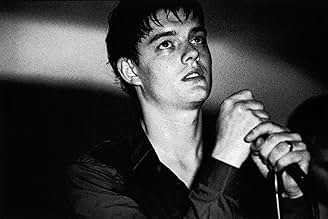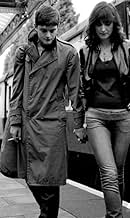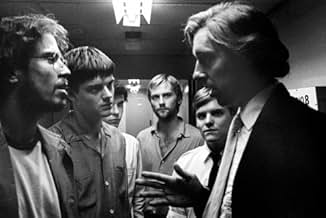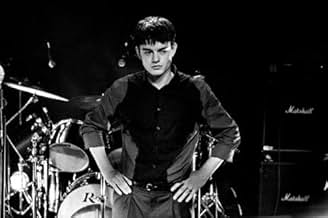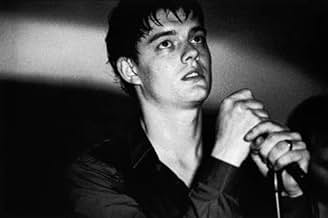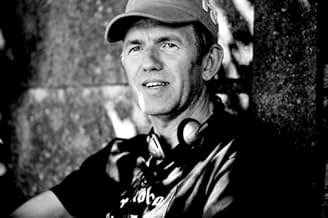ÉVALUATION IMDb
7,6/10
70 k
MA NOTE
Un profil de Ian Curtis, l'énigmatique chanteur de Joy Division dont les ennuis personnels, professionnels et romantiques l'ont conduit à se suicider à l'âge de 23 ans.Un profil de Ian Curtis, l'énigmatique chanteur de Joy Division dont les ennuis personnels, professionnels et romantiques l'ont conduit à se suicider à l'âge de 23 ans.Un profil de Ian Curtis, l'énigmatique chanteur de Joy Division dont les ennuis personnels, professionnels et romantiques l'ont conduit à se suicider à l'âge de 23 ans.
- Director
- Writers
- Stars
- A remporté le prix 1 BAFTA Award
- 31 victoires et 36 nominations au total
Martha Myers Lowe
- Ian's Sister
- (as Martha Myers-Lowe)
Mary Jo Randle
- Debbie's Mother
- (as Mary-Jo Randle)
Avis en vedette
The first thing that strikes you about 'Control' is its silence, and the chilly beauty of its black and white images. As a still photographer first-time director Anton Corbijn photographed Joy Division in black and white during their short existence. He knows how to get the remorselessly grim feel of the north of England in the late Seventies. (The boys came from the outskirts of Manchester. Joy Division formed in 1976.) This film (there's a documentary just coming out on the band too) is loosely based on a memoir of her marriage by Deborah Curtis, lead singer Ian Curtis' young wife, who had a baby girl by him and then tragically found him after he'd hanged himself in 1980, two months short of his twenty-fourth birthday, just as the band was to tour America for the first time.
'Control's' strength is a certain recessiveness. In the English style, it's offhand and avoids huge dramatic crescendos. That's refreshing. And besides the images and the restraint, the film is worth seeing for the concert sequences. The cast actually plays the Joy Division music live, and Sam Riley, who plays Ian Curtis, not only closely resembles him, but is a riveting and intense, almost at times scary, performer. When he says the public doesn't know how much of himself he puts into his performances, we know what he means.
The film is excellent at showing Ian's dilemmas. The band is a sudden success. He has an attack in their car as the band returns from a gig. Doctors tell him he has a form of epilepsy. He's given a fistful of pills to take every day and told to have early nights and stay off the booze. How faithfully he takes the pills is unclear but he suffers from their side effects in various ways, while late nights and booze are essentials of his existence. It doesn't seem that the English doctors knew very well how to treat him, and he was so busy performing he didn't take the time to go to specialists and have more extensive tests.
Ian had gotten married to Deborah (Samantha Morton) early--too early. On the road he meets a Belgian part-time journalist, Annik Honoré (Alexandra Maria Lara), and they fall uneasily in love. He's not strong enough to decide between the two women. Fear that his disease will only get worse hounds him, and the fits go on. Riley is fascinating to watch as he undergoes an increasingly visible meltdown. Other cast members are cyphers, though Joe Anderson, who has the role of Max in Taymor's Across the Universe, is the lead guitarist. Morton has a drab role but Deborah's unfortunate situation is present as a constant counterpart to Ian's story. The two other important characters are the Manchester music guru Tony Wilson (Craig Parkinson) and the band's wise-guy manager Rob Gretton (Toby Kebbell).
The creative inspiration of the band, the nature of their songs, the cast of their lyrics, the reason why Joy Division is a cult band today when it only existed for four years--these are matters the film is unable to elucidate. Watch it for the cool visuals, for the tall, soulful Sam Riley, and for the terrific live performance scenes. Enjoy the understatement, and the silence. Don't expect more.
Harvey Weinstein has chosen both for Control and for the soon-to-open Todd Haynes Bob Dylan film I'm Not There to have a slowly-unrolling distribution system, and hopes to bestow early cult status on both films by having them premiere at that temple of cinephilia, Film Forum, in lower Manhattan, New York City, and wait for the buzz of the cognoscenti to multiply and spread. It may work. But both films are tough sells. But A.E. Scott of the NYTimes has said Control is "enigmatic and moving, much in the manner of Joy Division's best songs." And that's a good send-off.
'Control's' strength is a certain recessiveness. In the English style, it's offhand and avoids huge dramatic crescendos. That's refreshing. And besides the images and the restraint, the film is worth seeing for the concert sequences. The cast actually plays the Joy Division music live, and Sam Riley, who plays Ian Curtis, not only closely resembles him, but is a riveting and intense, almost at times scary, performer. When he says the public doesn't know how much of himself he puts into his performances, we know what he means.
The film is excellent at showing Ian's dilemmas. The band is a sudden success. He has an attack in their car as the band returns from a gig. Doctors tell him he has a form of epilepsy. He's given a fistful of pills to take every day and told to have early nights and stay off the booze. How faithfully he takes the pills is unclear but he suffers from their side effects in various ways, while late nights and booze are essentials of his existence. It doesn't seem that the English doctors knew very well how to treat him, and he was so busy performing he didn't take the time to go to specialists and have more extensive tests.
Ian had gotten married to Deborah (Samantha Morton) early--too early. On the road he meets a Belgian part-time journalist, Annik Honoré (Alexandra Maria Lara), and they fall uneasily in love. He's not strong enough to decide between the two women. Fear that his disease will only get worse hounds him, and the fits go on. Riley is fascinating to watch as he undergoes an increasingly visible meltdown. Other cast members are cyphers, though Joe Anderson, who has the role of Max in Taymor's Across the Universe, is the lead guitarist. Morton has a drab role but Deborah's unfortunate situation is present as a constant counterpart to Ian's story. The two other important characters are the Manchester music guru Tony Wilson (Craig Parkinson) and the band's wise-guy manager Rob Gretton (Toby Kebbell).
The creative inspiration of the band, the nature of their songs, the cast of their lyrics, the reason why Joy Division is a cult band today when it only existed for four years--these are matters the film is unable to elucidate. Watch it for the cool visuals, for the tall, soulful Sam Riley, and for the terrific live performance scenes. Enjoy the understatement, and the silence. Don't expect more.
Harvey Weinstein has chosen both for Control and for the soon-to-open Todd Haynes Bob Dylan film I'm Not There to have a slowly-unrolling distribution system, and hopes to bestow early cult status on both films by having them premiere at that temple of cinephilia, Film Forum, in lower Manhattan, New York City, and wait for the buzz of the cognoscenti to multiply and spread. It may work. But both films are tough sells. But A.E. Scott of the NYTimes has said Control is "enigmatic and moving, much in the manner of Joy Division's best songs." And that's a good send-off.
Days away from embarking on a long dreamed about tour of the United States, Ian Curtis, the lead singer of the band Joy Division, hanged himself on May 23, 1980 from a rope in the kitchen of his apartment. His suicide not only ended his promising young life but also the dreams of a generation. Twenty seven years after his death, the eulogizing continues. Last year saw a documentary by Christian Davies: Joy Division: Under Review and this year has brought two more films: Joy Division: The Last True Story In Pop by Grant Gee and Control, the winner of the Camera d'Or at the Cannes Film Festival. Based on the 1996 memoir "Touching From a Distance" by Ian's widow Deborah Curtis, the film follows Curtis' life from his teenage years to his tragic death at age twenty three.
Unlike conventional bio-pics like Ray and Walk the Line with their star glamorizing propensities, Control delivers a three-dimensional portrait of a real human being and how his troubles affected the people closest to him. The film is directed by photographer and video director Anton Corbijn, a celebrated photographer who took some of the most recognized photos of Joy Division. Because he knew and worked with the band, the emotional connection to its subject is palpable. The film is shot in black and white and the choice underscores the grayness of Curtis' home town of Macclesfield, England and the grim mood of much of the work.
The major reason for the film's success, however, rests with lead actor Sam Riley who eerily recreates Curtis in appearance and voice. He performs all of the band's iconic songs such as Atmosphere, Love Will Tear Us Apart, and Twenty-Four Hours himself, using Curtis' robotic hand motions on stage to great effect. Another outstanding performance is that of Samantha Morton who plays Deborah Curtis, Ian's loving and patient wife who is overwhelmed by her husband's success and her new responsibilities as a mother of their daughter. Married at a very young age, both husband and wife lack the strength to make a go of it especially with the pressure of Curtis' epileptic seizures growing worse, and Ian's on again off again affair with Belgian journalist Annik (Alexandra Maria Lara).
Though the subject matter is melancholy, Matt Greenhalgh's script provides a light touch filled with trenchant one-liners from the group's manager Rob Gretton (Tony Kebbell) and witty remarks from band members Joe Anderson, James Anthony Pearson and Harry Treadaway. Although Curtis has become one of rock's most mythologized figures, Riley plays him simply as a very innocent, down to earth young man whose talent was much greater than his ability to handle it. Control is an extremely moving experience whether or not you have foreknowledge of the events of Curtis' life. It is a film that has the power to touch and leave memories that are indelible.
Unlike conventional bio-pics like Ray and Walk the Line with their star glamorizing propensities, Control delivers a three-dimensional portrait of a real human being and how his troubles affected the people closest to him. The film is directed by photographer and video director Anton Corbijn, a celebrated photographer who took some of the most recognized photos of Joy Division. Because he knew and worked with the band, the emotional connection to its subject is palpable. The film is shot in black and white and the choice underscores the grayness of Curtis' home town of Macclesfield, England and the grim mood of much of the work.
The major reason for the film's success, however, rests with lead actor Sam Riley who eerily recreates Curtis in appearance and voice. He performs all of the band's iconic songs such as Atmosphere, Love Will Tear Us Apart, and Twenty-Four Hours himself, using Curtis' robotic hand motions on stage to great effect. Another outstanding performance is that of Samantha Morton who plays Deborah Curtis, Ian's loving and patient wife who is overwhelmed by her husband's success and her new responsibilities as a mother of their daughter. Married at a very young age, both husband and wife lack the strength to make a go of it especially with the pressure of Curtis' epileptic seizures growing worse, and Ian's on again off again affair with Belgian journalist Annik (Alexandra Maria Lara).
Though the subject matter is melancholy, Matt Greenhalgh's script provides a light touch filled with trenchant one-liners from the group's manager Rob Gretton (Tony Kebbell) and witty remarks from band members Joe Anderson, James Anthony Pearson and Harry Treadaway. Although Curtis has become one of rock's most mythologized figures, Riley plays him simply as a very innocent, down to earth young man whose talent was much greater than his ability to handle it. Control is an extremely moving experience whether or not you have foreknowledge of the events of Curtis' life. It is a film that has the power to touch and leave memories that are indelible.
It's 1973 Macclesfield, England. Ian Curtis (Sam Riley) is a quiet enigmatic student. He marries Debbie Woodruff (Samantha Morton) in 1975. He works as an employment agent. On June 4, 1976, they attend a small Sex Pistols concert. Also in attendance are Bernard Sumner, Peter Hook, and Terry Mason. Ian joins them as their lead singer. They call themselves Warsaw and eventually Joy Division.
There is a sense of disconnection from this movie and a mystery about Ian Curtis. Sam Riley's performance, the long takes, and the black and white photography all make Ian an enigma. It's a slow burn but compelling. The tone is sad and respectful. It's very fitting of the band and its music.
There is a sense of disconnection from this movie and a mystery about Ian Curtis. Sam Riley's performance, the long takes, and the black and white photography all make Ian an enigma. It's a slow burn but compelling. The tone is sad and respectful. It's very fitting of the band and its music.
Making the leap from photographer to music video director to film director, Anton Corbijn's feature length debut 'Control' is quite simply stunning. Shot entirely in black and white it tell the story of Ian Curtis the lead singer with Manchester band Joy Division but its also much more than that it also tells of one mans journey into the heart of darkness (Apocalypse Now is mentioned in the film) a journey of fear, paranoia, illness and depression. Curtis has been played in films before but only as bit parts (24 hour party people etc) here he is portrayed breathtakingly by Sam Riley who played Mark E Smith in 24 hour party people and when he first appears on the screen I have to admit I wasn't convinced but as Ian the person grows so too does Riley into the role and at times he has him so down to a tee its hard to imagine its not the real Curtis up there. The rest of the band are pretty good as well but are only really second fiddle to Riley but you have to give them credit for learning all the songs and playing them live rather than mime. Samantha Morton is great as the put upon wife Deborah and Craig Parkinson is convincing enough as Tony Wilson but apart from Riley's stand out performance its Toby Kebbell as manager Rob Gretton who has some of the best lines and has come so far since his role in 'Dead Man's Shoes'. The cinematography is a visual feast for the eyes, being shot in black and white adds to the mood and gives a haunting feel that echo's the music and lyrics of the band, it also means (and I guess its Corbijn's photography background) that so many of the shots in the movie could be still images they are framed so well. Although never really explained in terms of answers, Curtis's illness from the seizures to the depression and the hopeless sense of falling apart reminded me of Catherine Deneuve in Polanski's 'Repulsion' another black and white film that deals with madness. I guess that treating mental illnesses was still in its infancy in the seventies, yes we'd stopped electro-shocking people but medications were still being developed and trialled. It seems it was very easy for Curtis to reach a certain point what with juggling home, life on the road, his condition and the pressure of increasing fame but when it came to helping him out he really was on his own and did feel a sense of 'isolation'. But with a story that has a widely known end point its more about the journey and here Corbjin punctures the narrative with some truly witty moments while leading up the incredibly moving and inevitable finale. Handled brilliantly by all involved this is another example of a great British film that deserves all the accolades it is receiving and if this performance is anything to go by expect Riley to be very big indeed.
For me personally writing a comment for Control has proved to be a very difficult thing, my love of the band Joy Division has stayed with me from the very first moment I listened to the Unknown Pleasures album back in 1979. I remember Ian Curtis's death like it was yesterday, and no matter how many years roll by, I still feel an immense sadness when listening to the bands poetic beauty. I was mightily relieved after reading Deborah Curtis's book Touching From A Distance, for I found it refreshingly honest, and certainly it helped people get in a bit deeper to just what a troubled young man Ian Curtis was. So here we are in 2008 and the film adaptation of that book has arrived with truly brilliant results.
I have found it hard to write a comment for it because I have to cast aside my biased love of the band, but hopefully I've managed to view it objectively with both my head and my heart. Control is a film about Ian Curtis, the lead singer of the band Joy Division, people expecting an in-depth film about the band will be a little disappointed because this is the story of their lead singer, a troubled young man who just couldn't face it anymore. Filmed in black & white to perfectly capture the essence of the man the film is about, director Anton Corbijn has stayed loyal to the source material and crafted a haunting piece of work that lingers long after the final credits roll.
We follow Ian Curtis from his humble music leanings in the early 70s, here he meets Deborah who is soon to become his wife, a married man at the age of 18. We watch him join a group of Manchester lads at a Sex Pistols concert, it is here that the roots of Joy Division are formed. Then it's on to the formation of Factory records and the influential Svengali Tony Wilson. As the band start to make waves Ian Curtis becomes ill with epilepsy, and it's here that Corbijn crucially shows that the doctors involved really didn't have a clue how to treat him properly, trial and error with cocktails of drugs indeed.
Deborah and Ian become parents to Natalie, but Ian is away on the road for many days and nights, and it's here that he yearns for love from another quarter, and it's here that his infidelity will hang heavy on his already sunken shoulders. The band are set to make it big, their manager announces that they are about to tour America for the first time, this only adds another fraught string to Ian's already fractured bow, the pressure of fame a lethal bedfellow with Messrs epilepsy and infidelity, and then? I can't praise the work on this film enough, Sam Riley {relatively unknown outside of his hometown of Leeds} is simply brilliant as Curtis, dragging the viewer in completely on this desperately sad journey. Samantha Morton as Deborah is immense, she nails the emotional see-saw role with professional aplomb, and I would also like to raise a glass for the performance of the criminally undervalued Toby Kebbell (Dead Man's Shoes, Wilderness) his turn as Joy Division's manager Rob Gretton is down pat. Director Corbijn clearly had love for the project, and thankfully he was sensible enough to not over do the sentimental aspect of the troubled star. What Corbijn has done is perfectly frame the bleaker side of the story with old terraced houses and monstrous looking high rise's, they scream out as dank and dreary statements in black & white, yet they are overlooked by rolling hills to serve as a reminder when Curtis was at his happiest during the courtship with Deborah. Some scenes are unforgettable, such is the power of the emotion on offer, look out for the stunning appearance of heart tugging song Love Will Tear Us Apart, a crucial and poignant scene, and of course the film's tragic outcome hits like a sledgehammer. To which I thank Corbijn for giving us a very tasteful conclusion to this sad sad story.
So there it is, was I biased? I like to think I wasn't because I honestly feel that one doesn't have to be a fan of the band to get much from this movie. The film has won many awards, and I'm happy to report that Control has brought renewed interest in the beautiful/haunting work of one of England's greatest ever bands. Remastered CDs, reissued books, and even T-shirts are selling well in the shops as I type.
Control is a very sobering experience for fans and newcomers alike. 10/10
RIP Ian Curtis, you are very much missed.
I have found it hard to write a comment for it because I have to cast aside my biased love of the band, but hopefully I've managed to view it objectively with both my head and my heart. Control is a film about Ian Curtis, the lead singer of the band Joy Division, people expecting an in-depth film about the band will be a little disappointed because this is the story of their lead singer, a troubled young man who just couldn't face it anymore. Filmed in black & white to perfectly capture the essence of the man the film is about, director Anton Corbijn has stayed loyal to the source material and crafted a haunting piece of work that lingers long after the final credits roll.
We follow Ian Curtis from his humble music leanings in the early 70s, here he meets Deborah who is soon to become his wife, a married man at the age of 18. We watch him join a group of Manchester lads at a Sex Pistols concert, it is here that the roots of Joy Division are formed. Then it's on to the formation of Factory records and the influential Svengali Tony Wilson. As the band start to make waves Ian Curtis becomes ill with epilepsy, and it's here that Corbijn crucially shows that the doctors involved really didn't have a clue how to treat him properly, trial and error with cocktails of drugs indeed.
Deborah and Ian become parents to Natalie, but Ian is away on the road for many days and nights, and it's here that he yearns for love from another quarter, and it's here that his infidelity will hang heavy on his already sunken shoulders. The band are set to make it big, their manager announces that they are about to tour America for the first time, this only adds another fraught string to Ian's already fractured bow, the pressure of fame a lethal bedfellow with Messrs epilepsy and infidelity, and then? I can't praise the work on this film enough, Sam Riley {relatively unknown outside of his hometown of Leeds} is simply brilliant as Curtis, dragging the viewer in completely on this desperately sad journey. Samantha Morton as Deborah is immense, she nails the emotional see-saw role with professional aplomb, and I would also like to raise a glass for the performance of the criminally undervalued Toby Kebbell (Dead Man's Shoes, Wilderness) his turn as Joy Division's manager Rob Gretton is down pat. Director Corbijn clearly had love for the project, and thankfully he was sensible enough to not over do the sentimental aspect of the troubled star. What Corbijn has done is perfectly frame the bleaker side of the story with old terraced houses and monstrous looking high rise's, they scream out as dank and dreary statements in black & white, yet they are overlooked by rolling hills to serve as a reminder when Curtis was at his happiest during the courtship with Deborah. Some scenes are unforgettable, such is the power of the emotion on offer, look out for the stunning appearance of heart tugging song Love Will Tear Us Apart, a crucial and poignant scene, and of course the film's tragic outcome hits like a sledgehammer. To which I thank Corbijn for giving us a very tasteful conclusion to this sad sad story.
So there it is, was I biased? I like to think I wasn't because I honestly feel that one doesn't have to be a fan of the band to get much from this movie. The film has won many awards, and I'm happy to report that Control has brought renewed interest in the beautiful/haunting work of one of England's greatest ever bands. Remastered CDs, reissued books, and even T-shirts are selling well in the shops as I type.
Control is a very sobering experience for fans and newcomers alike. 10/10
RIP Ian Curtis, you are very much missed.
Le saviez-vous
- AnecdotesThe actors playing Joy Division learned how to play the songs themselves. So the scenes where the band is playing live is not from tape, but actually the actors playing live.
- GaffesJoy Division is shown performing "Transmission" on Tony Wilson's television show in September 1978, but in reality, they performed "Shadowplay". The performance that is represented in this scene actually took place a year later in September 1979 on the BBC2 program "Something Else", when they performed "Transmission" (a performance which was used as the music video for the song) and "She's Lost Control".
- Citations
Ian Curtis: Existence. Well, what does it matter? I exist on the best terms I can. The past is now part of my future. The present is well out of hand.
- Générique farfeluSPOILER: Epilogue: "Ian Curtis died May 18, 1980. He was 23 years old."
- Bandes originalesDrive-In Saturday
(David Bowie)
Published by kind permission of Tintoretto Music/RZO Music Ltd/EMI Music Publishing Ltd/Chrysalis Music Ltd © 1973
Performed by David Bowie
Courtesy of RZO Music
Meilleurs choix
Connectez-vous pour évaluer et surveiller les recommandations personnalisées
- How long is Control?Propulsé par Alexa
- Is 'Control' based on a book?
- Which Joy Division songs appear in the movie?
- Why was Tony Nuttall's name (from the book) changed to Nick Jackson for the film?
Détails
- Date de sortie
- Pays d’origine
- Site officiel
- Langue
- Aussi connu sous le nom de
- Control
- Lieux de tournage
- sociétés de production
- Consultez plus de crédits d'entreprise sur IMDbPro
Box-office
- Budget
- 4 500 000 € (estimation)
- Brut – États-Unis et Canada
- 872 252 $ US
- Fin de semaine d'ouverture – États-Unis et Canada
- 27 674 $ US
- 14 oct. 2007
- Brut – à l'échelle mondiale
- 8 159 996 $ US
- Durée2 heures 2 minutes
- Couleur
- Mixage
- Rapport de forme
- 2.35 : 1
Contribuer à cette page
Suggérer une modification ou ajouter du contenu manquant






